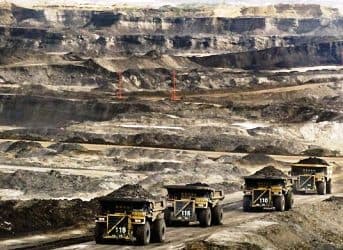Provincial leaders in energy-rich Canada are reviewing ways to send oil from Alberta province to eastern refineries in an effort to ensure energy independence. Most of the refineries in the country's east process imported, and more expensive, crude oil. Leaders in the west, meanwhile, have objected to proposals to ship tar sands from Alberta to port cities because of environmental fears. Supporters of the move east say it's a "good story" for Canada, though many of the country's ambitious energy plans on the books are up against fierce opposition.
Provincial leaders from Alberta and Quebec last week agreed to set up a working group to examine ways to send tar sands oil to refineries in Quebec, some of the largest in Canada. Pipeline companies Enbridge and TransCanada, for their part, are looking to modify some of their existing pipeline networks to move oil away from the Alberta market, which depends in part on the United States. Greg Selinger, premier for the government of Manitoba, Alberta's eastern neighbor, said the shift east would be "a good story" for booming Canadian oil markets.
Last week, Simon Henry, chief financial officer at Royal Dutch Shell, told investors at a Canadian energy summit in London that the boom in the North American oil sands market was "historic." In the 2000s, he said Canada had proven oil reserves of around 5 billion barrels. Now, he said, that level has reached 180 billion barrels. If companies like Shell can figure out a way to address the environmental concerns associated with tar sands, Canada can become a major oil supplier to global and European markets, said Henry.
Related Article: Ontario Smacked by U.S. Lawsuit on Fracking
Environmental concerns, however, are precisely what most opponents of pipeline plans focus on most. The provincial government in British Columbia, to Alberta's west, has objected to plans by Enbridge to build the $6 billion Northern Gateway oil pipeline. Enbridge last week reported a minor spill near Chicago. During the summer, the company's Line 14 network spilled more than 1,000 barrels of oil in Wisconsin. And in 2010, the company's pipeline system in Michigan ruptured, resulting in the costliest onshore incident in U.S. history. For TransCanada, concerns about the route for the Keystone XL oil pipeline through Nebraska and ongoing civil disobedience has left parts of the $5.3 billion project off the table for now.
Voters in Alberta's provincial capital Edmonton took part this week in by-elections that could signal a shift away from the Conservative base of Prime Minister Stephen Harper. His government has so far pushed aggressively to secure foreign investments in the country's booming energy sector. That, however, means embracing contentious projects like a $15 billion take-over bid for Canadian energy company Nexen by China's state-owned oil company CNOOC Ltd. While any vote this week in favor of Harper's opponents is unlikely to shift the balance of power in the central government, it could start a sea change in the Canadian oil sector where billions of barrels of oil and billions of dollars of infrastructure are at stake.
By. Daniel J. Graeber of Oilprice.com



















There is only one by-election in Alberta the other two are in BC and Ontario.
The results of the by-elections can make no difference.
This is what he actually said: It’s remarkable to reflect that it’s only a decade since Canada increased its proven oil reserves from 5 billion barrels to 180 billion.
The difference between proved reserves (what he said) and daily production (what you incorrectly quoted) is about five orders of magnitude.
There must be a controlled push for renewable energy while regulating the development and usage of unconventional fossil fuels.
There is far too much anger at Harper. He has given China permission to sue, anyone blocking Communist China, from their intrusions into Canada. Canadians do not want Communist China on our soil, what-so-ever.
In BC. Harper and Gordon Campbell did a lot of dirt to BC. The BC citizens are firmly supporting the F.N. People, to keep the atrocities of the Enbridge pipeline and the behemoth dirty oil tankers out of BC. Enbridge has out and out blatantly lied and used, every dirty tactic in the book, to force their way into BC.
This very dirty oil is going to, one of the most polluted country's in the world. At what point, will common sense trump greed?
It's as they say. Man is the most destructive animal on earth and, the most stupid one at that.